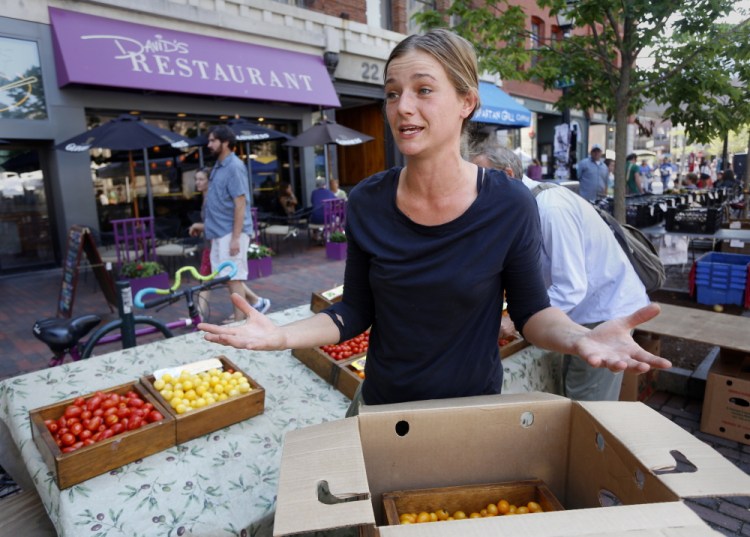The LePage administration on Wednesday announced a new “asset test” that would make people ineligible for food stamps if they have more than $5,000 in the bank or own certain other items worth more than that amount, such as a snowmobile, boat, motorcycle or ATV. Critics of the rule change say the asset test creates a disincentive for low-income people to save money.
The new rule – which will be the subject of a public hearing Oct. 6 in Augusta – would apply only to households with no children. About 225,000 Mainers receive food stamps, and some 8,600 of them would be affected by the rule, according to the Maine Department of Health and Human Services. The rule would exempt equity in a home and a primary vehicle.
The agency didn’t have an estimate on how many of the 8,600 might fail the asset test and become ineligible for benefits. The cost of implementing the rule would be negligible and would not require additional staff or money, said DHHS spokesman David Sorensen.
The rule would take effect sometime after the public hearing, with no legislative vote required.
Food stamps are an income-based program, and people who apply must disclose their earnings. Under the proposed rule, applicants would have to make additional disclosures and report their bank balances and ownership of specific assets, including snowmobiles, boats, motorcycles, Jet Skis, all-terrain vehicles, recreational vehicles and campers. Cash and the value of assets would be added together to determine whether the $5,000 threshold had been reached.
“Most Mainers would agree that before someone receives taxpayer-funded welfare benefits, they should sell non-essential assets and use their savings,” Gov. Paul LePage said in a written statement. “Hardworking Mainers should not come home to see snowmobiles, four-wheelers or Jet Skis in the yards of those who are getting welfare. Welfare is a last resort, not a way of life.”
The test announced Wednesday is the latest in a series of steps the administration has taken to reduce food stamp distributions. Last year it established work and volunteer requirements for adult recipients who aren’t disabled and have no children. More than 9,000 people failed to meet those requirements and were dropped from the program, reducing the flow of federal money into Maine by about $21.6 million a year, according to DHHS.
Maine is one of 36 states that do not require an asset test to receive food stamps, and it would become the only state in the Northeast to do so. States are authorized to apply the asset test under federal law, but Maine has historically waived the test.
“What’s next? Grandma can’t buy groceries until she sells her engagement ring?” said Rep. Drew Gattine, D-Westbrook, co-chair of the Legislature’s Health and Human Services Committee.
Since the program is entirely funded by the U.S. Department of Agriculture, restricting access to food stamps would not reduce the state budget. What would be reduced is the flow of federal money into Maine for beneficiaries to spend at supermarkets, convenience stores, farmers markets and other vendors who accept food stamps.
Maine DHHS administers the food stamp program, known formally as the Supplemental Nutritional Assistance Program, which is designed to help low-income families purchase food. Food stamp recipients typically have $333 in savings, according to the USDA.
CRITIC: TESTS HURT SELF-SUFFICIENCY
Rachel Black, a senior policy analyst for New America, a Washington, D.C.-based think tank, said studies from other states show that less than 5 percent of food stamp recipients would have enough savings or assets to fail an asset test.
She was critical of the asset test because it discourages people from saving money and having a cushion to fall back on.
“It’s antithetical to the idea of promoting self-sufficiency,” she said.
A former chairman of the Legislature’s Health and Human Services Committee said the rule is another way to “shame people from using the SNAP program” and “counterproductive” because it encourages people to spend down their savings.
“We have so many people who are food insecure and this is just another way to put more people in that category,” said Rep. Richard Farnsworth, D-Portland. “This is morally unconscionable.”
Sorensen said taxpayers should not pay for food for people who have the means to pay for it themselves.
“If these individuals have $6,000 in the bank, they should pay for their own groceries,” he said in a written statement.
Jason Worcester, 30, said Wednesday he has used food stamps off and on over the years when he was between jobs. He described the proposed policy as “total class warfare.”
An Army veteran, the Washington County native has worked on lobster boats and in construction and veterinary medicine.
“I was on (food stamps) up until a couple of months ago,” Worcester said, standing with friends in Tommy’s Park in Portland. Originally from Columbia Falls in Washington County, Worcester said he is living out of his car in Portland as he works a construction job that he got through MaineWorks.
The idea of a $5,000 asset test is “ridiculous,” he said.
“Five thousand dollars is not much,” he said. “All my money goes to child support and divorce costs and fixing my car. You know, life costs.”
Farnsworth, the Portland legislator, is concerned about low-income seniors going hungry if they fail an asset test.
FIGHTING ‘CULTURE OF ENTITLEMENT’
But Ken Fredette, R-Newport and the House Republican leader, said in a written statement supporting the new rule that tax dollars “must be used for those most in need and not those who would abuse our system.”
DHHS Commissioner Mary Mayhew said the rule reflects an ongoing effort by the LePage administration, which is engaged in “transforming the welfare system from a culture of entitlement to a culture of self-reliance.”
She said in a written statement, “When people see that some are using welfare as a first line of defense to keep their boats and motorcycles, rather than using welfare as a safety net, it hurts the public perception of the program.”
However, Black, the Washington policy analyst, said the opposite is true – that asset tests are an impediment to low-income people becoming self-reliant and emerging from poverty. “Research from Maryland and Virginia has shown that the longer a state has eliminated the asset limit, there’s a correlation to an increase in savings,” she said.
Another reason the tests are counterproductive, Black said, is that some low-income people don’t fill out the assets paperwork properly and are then denied benefits, even if they have meager assets and would otherwise qualify.
Before 2002, all states had to administer an asset test to food stamp recipients, but since then the USDA has given states the flexibility to waive the tests. In 2008, the agency recommended that states waive the asset tests, and a number have since taken that step, Black said.
She said the asset tests are inefficient to administer, because so few fail the test. Also, states were looking at ways to streamline operations during the recession – when states were flooded with food stamp applications – so eliminating the tests was an easy fix, Black said.
For one Yarmouth farmer, cutting off food stamps to some people will force them to eat less healthy food.
“There’s a lot of poor people around here and they deserve to eat good food,” said Whitney Graham, who works at Beckwith Farm and was at the Portland Farmers Market, which accepts food stamps. Graham said the asset limit was also set too low.
“Five thousand dollars, that’s not even a cushion,” she said. “That’s not much money, particularly heading into winter.”
Send questions/comments to the editors.






Success. Please wait for the page to reload. If the page does not reload within 5 seconds, please refresh the page.
Enter your email and password to access comments.
Hi, to comment on stories you must . This profile is in addition to your subscription and website login.
Already have a commenting profile? .
Invalid username/password.
Please check your email to confirm and complete your registration.
Only subscribers are eligible to post comments. Please subscribe or login first for digital access. Here’s why.
Use the form below to reset your password. When you've submitted your account email, we will send an email with a reset code.